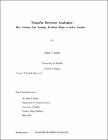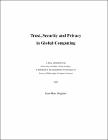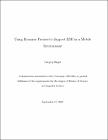Browsing Computer Science Technical Reports by Title
Now showing items 254-273 of 280
-
TATUS A Ubiquitous Computing Simulator
(Trinity College Dublin. Department of Computer Science, 2004-09)?... we are trying to conceive a new way of thinking about computers in the world, one that takes into account the natural human environment and allows the computers themselves to vanish into the background? - Mark Weiser, ... -
Testing Formal Semantics: Handel-C
(Trinity College Dublin. Department of Computer Science, 2005-09)This dissertation addresses the formal semantics of Handel-C: a C-based language with true parallelism and priority-based channel communication, which can be compiled to hardware. It describes an implementation in the ... -
Testing of a Novel Distributed Shared Memory Framework
(Trinity College Dublin. Department of Computer Science, 1999-09)A novel object oriented framework for software Distributed Shared Memory (DSM) has been developed by the Distributed Systems Group in Trinity College, Dublin for programming parallel applications on a group of loosely ... -
TinyTorrent: Combining BitTorrent and SensorNets
(Trinity College Dublin. Department of Computer Science, 2005-09)The first of the two goals of this research was to investigate the BitTorrent protocol to determine what features make it successful on an Internet scale. These features include its ability to rapidly replicate data ... -
A Toolkit for the Visualisation of CORBA Applications
(Trinity College Dublin. Department of Computer Science, 2000-09)VEDA is a visualisation environment that allows the operation of distributed applications to be visualised graphically for the purposes of testing and education. It contains a visualisation package which enables distributed ... -
Trading Privacy for Trust
(Trinity College Dublin, Department of Computer Science, 2004-08-26)Both privacy and trust relate to knowledge about an entity. However, there is an inherent conflict between trust and privacy: the more knowledge a first entity knows about a second entity, the more accurate should be the ... -
Transfer Between Analogies: How Solving One Analogy Problem Helps to Solve Another
(Trinity College Dublin, Department of Computer Science, 1995-04)This paper deals with transfer between analogies; with what people acquire from one analogy problem-solving episode that can be re-applied to a subsequent analogy, problem-solving episode. This issue must be resolved if ... -
Trust Based Dynamic Source Routing in Mobile Ad-Hoc Networks
(Trinity College Dublin. Department of Computer Science, 2002-09)The notion of an ad hoc network is a new paradigm that allows mobile hosts (called nodes) to communicate without relying on a predefined infrastructure to keep the network connected. Most nodes are assumed to be mobile and ... -
Trust Enhanced Ubiquitous Payment without Too Much Privacy Loss
(Trinity College Dublin, Department of Computer Science, 2004-08-26)Computational models of trust have been proposed for use in ubicomp environments for deciding whether to allow customers to pay with an e-purse or not. In order to build trust in a customer, a means to link transactions ... -
Trust Propagation in Small Worlds
(Trinity College Dublin, Department of Computer Science, 2003-04-30)The possibility of a massive, networked infrastructure of diverse entities partaking in collaborative applications with each other increases more and more with the proliferation of mobile devices and the development of ... -
Trust, Security and Privacy in Global Computing
(University of Dublin, Trinity College, School of Computer Science and Statistics, 2005-03)During the past thirty years, the world of computing has evolved from large centralised computing centres to an increasingly distributed computing environment, where computation and communication capabilities are being ... -
Unemployment: A Technologist's Perspective
(Trinity College Dublin, Department of Computer Science, 1993-09) -
A Unified Security Framework for Networked Applications
(Trinity College Dublin, Department of Computer Science, 2003-04-23)Various security models have been proposed for different types of applications and numerous types of execution environments. These models are typically reinforced by adding code to the application, which authenticates ... -
Using Case Retrieval to Seed Genetic Algorithms
(Trinity College Dublin, Department of Computer Science, 1997)In this paper we evaluate the usefulness of seeding genetic algorithms (GAs) from a case-base. This is motivated by the expectation that the seeding will speed up the GA by starting the search in promising regions of the ... -
Using CBR techniques to detect plagiarism in computing assignments
(Trinity College Dublin, Department of Computer Science, 1993-09)The problems of case retrieval in CBR and plagiarism detection have in common a need to detect close but not exact matches between exemplars. In this paper we describe a plagiarism detection system that has been inspired ... -
Using Distributed Technology for Teaching Distributed Systems
(Trinity College Dublin. Department of Computer Science, 1999-09)Current developments in multimedia and Internet technologies are enabling their wide use as a means for delivering education and training. There is much diversity and no single architecture has yet emerged as the ... -
Using Diversity in Preparing Ensembles of Classifiers Based on Different Feature Subsets to Minimize Generalization Error
(Trinity College Dublin, Department of Computer Science, 2001-04)It is well known that ensembles of predictors produce better accuracy than a single predictor provided there is diversity in the ensemble. This diversity manifests itself as disagreement or ambiguity among the ... -
Using Dynamic Proxies to Support RMI in a Mobile Environment
(Trinity College Dublin. Department of Computer Science, 2001-09)The emergence of small, mobile computing devices such as personal digital assistants and cellular telephones has been driven by advances in computing and wireless communication technologies. The development of distributed ... -
Using Early Stopping to Reduce Overfitting in Wrapper-Based Feature Weighting
(Trinity College Dublin, Department of Computer Science, 2005-05-18)It is acknowledged that overfitting can occur in feature selection using the wrapper method when there is a limited amount of training data available. It has also been shown that the severity of overfitting is related to ... -
Using Early-Stopping to Avoid Overfitting in Wrapper-Based Feature Selection Employing Stochastic Search
(Trinity College Dublin, Department of Computer Science, 2005-05-11)It is acknowledged that overfitting can occur in feature selection using the wrapper method when there is a limited amount of training data available. It has also been shown that the severity of overfitting is related ...























